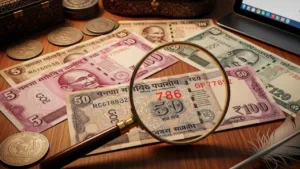If you give money to your wife every month for expenses, whether in cash or through a bank transfer, be cautious. According to Income Tax Rules, this money could be considered part of your income and may lead to a tax notice. Many people are unaware of this rule and could get into trouble later. Let’s take a look at what the Income Tax Law says about this and how you can avoid any issues.
There are certain important rules under the Income Tax Law that you must be aware of. While cash transactions between husband and wife are common, even giving money to your wife can lead to a tax notice in certain situations.
Rules of Clubbing of Income
It is essential to follow Sections 269SS and 269T under the Indian Income Tax Act. Typically, if a husband gives cash to his wife for household expenses or as a gift, there is no tax liability on it. This amount is considered the husband’s income, and no tax is levied on the wife. However, if the wife uses this money for investments (such as fixed deposits, the stock market, or buying property) and earns income from it, then she will be required to pay tax on that income. Under the “Clubbing of Income” rule, the income generated from her investments will be added to the husband’s income, which may increase his tax liability.
What Are Sections 269SS and 269T?
Sections 269SS and 269T regulate cash transactions to prevent black money.
1. Section 269SS: It prohibits accepting cash above ₹20,000 as a loan, deposit, or advance payment. If the husband gives his wife more than ₹20,000 in cash, the transaction must be done through banking channels (like cheque, NEFT, RTGS).
2. Section 269T: If borrowed money exceeding ₹20,000 needs to be repaid, it must also be done through banking channels. For close relationships, such as between husband and wife, there is no penalty for violating these sections. However, it is crucial to maintain transparency.
Rules for Money Given to Your Wife
For Household Expenses
The husband can give any amount to his wife for household expenses. There is no tax liability on this amount, and it is considered part of the husband’s income.
For Investments
If the wife invests the money (e.g., in fixed deposits, the stock market, or property), the income generated from those investments will be taxed. For example, if the wife’s investment earns ₹1,00,000, that amount will be added to the husband’s income and taxed.
Rental Income
If the money given to the wife is used to buy property and generates rental income, that rent will be considered the wife’s income, and tax will be levied on it.
Gift Tax Rules
If the husband gives money to his wife as a gift, it is not taxable. The Income Tax Act treats husband and wife as close relatives, and gifts between them are tax-exempt.
How to Avoid a Tax Notice
- Do not make cash transactions exceeding ₹20,000.
- Use banking mediums (cheque, NEFT, RTGS).
- Ensure the wife’s investments and the income generated are correctly reported in the Income Tax Return (ITR).
- Pay tax on the wife’s income from investments (e.g., FD, property, etc.) on time.
When Could a Tax Notice Be Issued?
A tax notice can be issued if there is a lack of transparency in cash transactions between husband and wife or if the wife does not disclose the income earned from that money. The Income Tax Department may take action, especially if the money was used to avoid taxes.
In summary, there is no direct tax rule on cash transactions between husband and wife, but it’s crucial to follow the provisions of the Income Tax Act. Keeping transactions transparent and maintaining proper records will help avoid a tax notice.










